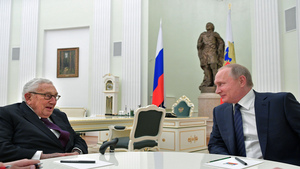His geopolitical consulting company said that Henry Kissinger, who was U.S. Secretary of State, died Thursday at the age of 100. Kissinger changed not only U.S. foreign policy but also Russia’s forever as the main person who worked to end the Cold War and make peace between the U.S. and the Soviet Union.
Before he died, Kissinger was very worried about how things were getting worse between the US and Russia because of the war in Ukraine. Still, he spoke out more and more in favor of Ukraine joining NATO, telling European leaders that it would be “madly dangerous” for them to change their minds about Kyiv joining the U.S.-led military alliance.
Early this year, Kissinger told The Economist, “If I talked to Putin, I would tell him that he is safer with Ukraine in NATO as well.”
The former Secretary of State was also pessimistic about the future of Russia-China ties because Russia was cut off from the West. He felt that both Beijing and Moscow looked down on each other, even though the two countries said they had a “no-limits” partnership.
“Every Russian leader I’ve met has said bad things about China. He also said, “I’ve never met a Chinese leader who said nice things about Russia.”
Even though Kissinger’s views changed a lot over the years, especially when it came to Russia, people in Moscow were shocked and honored when they heard about his death. The Moscow Times has put together some of those responses:
Vladimir Putin, the president
The Russian leader called Kissinger an “outstanding diplomat, a wise and far-sighted statesman” in a statement released by the Kremlin on Thursday.
Putin continued, “For many decades, [Kissinger] had a good reputation all over the world.” “A pragmatic approach to foreign policy is inextricably linked with the name Henry Kissinger. He once made it possible to achieve detente amidst international tension and to make the most important agreements between the US and the USSR that strengthened global security.”
Mikhail Medvedev
The former president of Russia wrote a word of condolences on X (formerly Twitter) about Kissinger’s death. He chose to write it in English instead of his native Russian.
The former U.S. Secretary of State had “faithfully served his country for many years,” according to Medvedev. He called him a “pragmatist” who “took reality into account and not just followed U.S. foreign policy canons.” Now, there are no more people like him in the Western world or the U.S. government.
Vladimir Kosachev
On the messaging app Telegram, the head of the upper chamber of the Federation Council’s Foreign Affairs Committee said that Kissinger’s name is linked to “building diplomatic ties between the US and China, arms control talks with the USSR, and the growth of ties between Israel and its Arab neighbors.”
Kosachev went on to say, “There were many dark spots in Kissinger’s biography: he was involved in the operation to remove Salvador Allende as President of Chile, which was democratically elected; he was also involved in the deaths of civilians in Cambodia; and much more.”
Still, he wrote, the former U.S. Secretary of State “will go down in history as an outstanding diplomat, firmly and skillfully defending the interests of his country and trying, even in the face of the current madness and crushing of Western politicians, to revive diplomacy and dialogue.”
The Great Leader Boris Titov
The head of the right-leaning Party of Growth and Vladimir Putin’s business watchdog said that Kissinger’s death had left a “sudden vacuum” that couldn’t be filled with hollow words or platitudes.
Titov wrote on Telegram, “Kissinger became a symbol of the ability to talk things out and find common ground in order to reach great goals.” “Kissinger’s most important lesson is that people don’t have to fight each other in politics and war all the time.
“His idea of what it meant to be a leader came from seeing disagreements as chances to make things better. Taking this approach has helped and might help in the future to bring together the way Russians think about values, American realism, and Eastern wisdom to reach a shared goal.




















